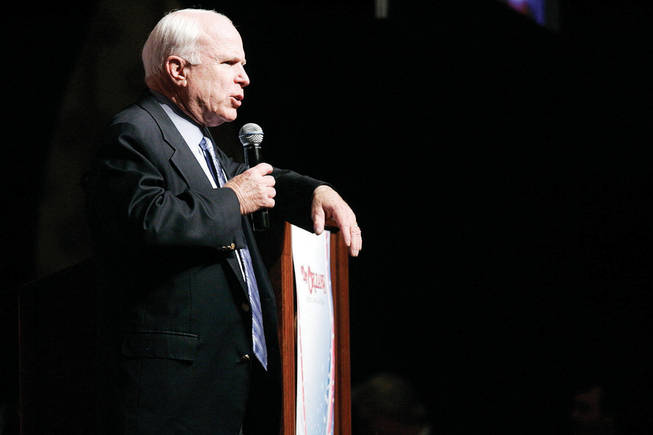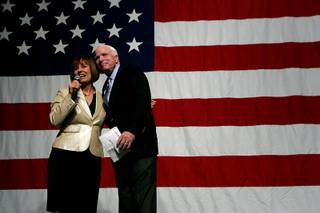
Sen. John McCain, R-Ariz., speaks at a rally Friday night for Republican Senate candidate Sharron Angle at the Orleans.
Monday, Nov. 1, 2010 | 2 a.m.
Survey
Sun Archives
Sun Coverage
Sen. John McCain isn’t the first Arizona Republican to cross into the Silver State to stump for Sharron Angle. But for McCain, who strutted his Johnny-come-lately Tea Party stripes campaigning for the U.S. Senate challenger this weekend, the swing may not have just been about helping Republicans take the majority in Washington.
Even if Republicans fall short in the Senate, as expected, McCain has a quiet interest in keeping Senate Majority Leader Harry Reid from winning: Reid is the only obstacle between McCain and his energy platform, which relies on construction of a nuclear waste repository at Yucca Mountain.
Over the years, Reid and McCain have been classic congressional “frenemies” around many issues, but Yucca Mountain has long divided them.
The senators go back a long way — to 1982, when they both were elected to the House, and 1986, when each was elected to the Senate — and so does their discord over this issue.
Reid and McCain cast their first vote on Yucca as freshman senators in 1987, over the 1988 omnibus spending measure that came to be known as the “Screw Nevada” bill because it designated Yucca Mountain as the only site for nuclear waste deposits. Reid voted against it.
The division reflects their diverging views on energy policy.
Reid has rested much of his hope for a legacy on the green jobs revolution, and much of his plan for Nevada’s slow climb out of recession on the back of high-paying jobs that solar, wind and energy projects have begun to create around Nevada.
Arizona barely has a renewable energy industry, which may be why McCain has voted against renewable subsidies as he’s supported them for nuclear development. Arizona’s only power plant at Palo Verde is the largest of the country’s 100-plus active nuclear energy facilities.
The last time Yucca came up for a vote, in 2009, the Senate, led by Reid, passed an energy spending bill that included scrapping Yucca Mountain as a dump site, by a vote of 85-9.
While McCain appeared to soften on the issue during his presidential campaign, given Obama’s strong opposition to it, he had flipped back by the July vote: He was one of the nine senators to oppose it.
Many lawmakers have suspected that Obama’s opposition to Yucca might waiver free of Reid’s influence. McCain told reporters during Congress’ last work period that Reid’s stubborn refusal to budge on Yucca Mountain was chiefly to blame for keeping the country’s nuclear industry in check.
Enter Angle, who wants to put Yucca back on the map as a reprocessing facility for nuclear waste.
McCain has not trumpeted his support for the Yucca Mountain project in Nevada, where the idea of waste dumping tends to turn off voters. But during McCain’s Friday night appearance in front of Angle’s Tea Partyers from Nevada, local issues like Yucca were not on the agenda.
Not that that issue would necessarily be a candidacy-killer in that crowd — attendees cheered a video shown during the event that depicted green jobs as a “scam.”
For McCain and Angle to share the same stage would have been unthinkable a year ago. Since his loss in the 2008 presidential race, McCain has been on a bender to solidify his conservative roots for his 2010 re-election bid.
Despite his timing, his route from “maverick” to not-maverick didn’t go through the Tea Party at first, which initially backed his primary opponent, J.D. Hayworth. But by the time McCain won his Aug. 25 primary, he had secured — with the help of his former running mate Sarah Palin — the Tea Party’s stamp of approval.
Yucca Mountain, and energy policy generally, isn’t the only place McCain could stand to gain without Reid in his way.
McCain has been campaigning against his colleagues in Nevada and California, where Barbara Boxer is facing former McCain campaign adviser Carly Fiorina.
Boxer has backed Reid in his anti-Yucca position. But were both to lose, it’s not just Yucca that gets opened for renegotiation.
McCain is taking aim at two of the Senate’s biggest and most senior backers of renewable energy and high-speed transportation, and two potential competitors for water resources.
California and Nevada have long been in discussions over renewable energy development: California has got the demand, and Nevada has got the space and resources to produce it. They also are talking transportation: the country’s first dedicated high-speed rail system is slated to be built between each state’s largest population center, Las Vegas and Los Angeles.
But those projects rely on federal loan guarantees, many of which are set to expire by year’s end, meaning Congress has to pass legislation soon to keep those fledgling industries going.
And then there’s the Colorado River.
On the campaign trail in 2008, McCain called for a renegotiation of the Colorado River Compact of 1922, in which the seven states on the river’s route agreed to divide the river’s resources, to ensure no one state kept others downstream from being able to count on a steady water supply.
The river’s levels have been receding. But that doesn’t mean everybody’s jazzed about redrafting the compromise. In Nevada, state officials have warned against renegotiation, because Nevada could stand to see its cut of the river’s resources reduced if the whole deal is reworked.
That possibility inches closer toward likelihood without the clout of someone like Reid to balance out McCain.


Join the Discussion:
Check this out for a full explanation of our conversion to the LiveFyre commenting system and instructions on how to sign up for an account.
Full comments policy